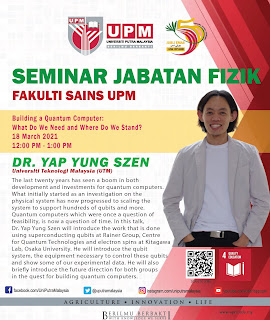Ever since the beginning of the Covid-19 pandemic, we have seen several notable scholars (international and local) and close friends/relatives leaving us. Will try to say a few words about them and the influence they had on me.
First, is the passing of John Conway himself on April 11, 2020. It is reported that he had contracted Covid-19 and succumbed to the disease. I knew first of Conway, like everyone else I guess, through the Game of Life. I was toying around the idea of research in cellular automata at the time. I even bought Ilachinski's book on the subject, but the research initiative did not materialise. The other influence from him is through finite groups which had a role in my research on hyperbolic surfaces (but not the groups named after him). At some point, I even tried to invite him to EQuaLS but somebody in Princeton replied saying good luck to me, implying it is difficult to get him. The reason for the invite is possibly two-fold, to get his insights for finite groups and also his work on Free Will Theorem. In his interview, he revealed he wished he did not invent the Game of Life, but he was rather proud of his work on Free Will Theorem.
The other mathematics legend who passed away, is Vaughan Jones, who left on September 6, 2020. His work best known to physicists is Jones polynomial that helps characterise knot invariants. Did experiment a little bit with these via a MSc student studying the cases of more than 10 crossings, but we stopped since we could not discover any significant new results then. Later, was informed by Michel Planat that our work on hyperbolic surfaces could have been extended to include quantum information and knots (see here, here and here). Unfortunately, due to unfavourable local circumstances, I miss out an opportunity to work further with Planat.
More recently, Isadore Singer passed away on February 11, 2021. He is best known for his work with Michael Atiyah on the Atiyah-Singer index theorems. I had the opportunity to learn them when I did my Part III essay on Witten index. There is this interview that I had posted on FB and I recommend it for students to listen, particularly on academic freedom and the danger of using jargon without proper understanding.
Closer to home, on December 15, 2020, Ungku Abdul Aziz passed away. He is known to all Malaysians in many different circles and particularly, he is the person responsible for the development of Tabung Haji that has helped Malaysian muslims to perform hajj (given this is expensive to most ordinary folks). He is also the only Royal Professor to date, which is a title held for life. Coincidentally, listened to a forum last night in his remembrance - see https://fb.watch/3ZxHHHeHNF/.
Also, close to the department is the passing of Dr. Norlaily. I knew her since she was a student at Physics Department. While she was doing her PhD, I did follow her blog for a while. When she came back, I wasn't around the department that much then but I know that she was active in the department, particularly as the coordinator for Academic Advisors. It came to a surprise for me, that she was ill from cancer and she passed away on June 25, 2020.

Much earlier, before the pandemic, was the passing of my school-mate of the same class, Prof. Mashitah Yusoff, who also concealed her illness from cancer. I believe her passing on January 24, 2020 came to all of us as a shock. Despite her high ranks, I remembered her visiting me once in the department and once in the institute (she commented on the use of plastic flowers then, since she is very much an environmentalist); very humble. She also invited me to visit UMP while she was the Dean, I believe. Occasionally, we corresponded over a few administrative matters.

Back in UPM, Prof. Arfah Salleh also left us on December 20, 2020. I did not know her that personally close despite possibly meeting her in some university functions. Just when the pandemic started last year, we corresponded through WhatsApp mainly due to her interest in the philosophy of quantum theory with ramifications in social sciences, particularly on human governance with Islamic outlook. I did not get to delve into her ideas to know more of what she is thinking but she introduced me to the work of her daughter and the work of Tarja Kallio-Tamminen. Due to preoccupation of my own research, I regretted that I have not discussed more with her.

Another friend who passed away earlier this year, is Hashim Ishak whom I met in Adelaide. He used to put me up at his place when I was in transition of place to live then. In many occasions, we met when we had some social events to go to (mostly in the weekends). Back here, he was in contact with me two years back, always inviting me to go for some coffee/tea somewhere but I was busy then and thereafter the pandemic arrived. He left us on January 5, 2021 rather suddenly. Regretted that I did not get to see him before.
Finally, closer to home, is the eldest brother to my other half, Saharuddin who left us on October 3, 2020. He was in Seremban hospital and we accompanied his body to Segamat for his final resting place. May Allah grant him forgiveness and placed among the faithful in the hereafter.






















